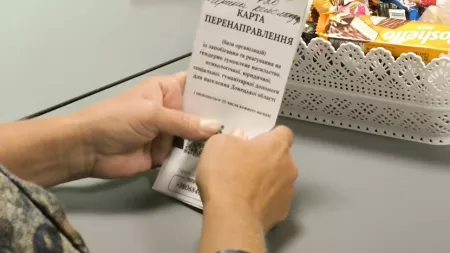Natalia*, a 60-year-old woman from the war-torn town of Kostiantynivka in the Donetsk region walks into the community center of CARE’s partner organization, Avalyst in Sloviansk, smiling despite the hardships she has faced.
She immediately starts opening her bag: "I have a talisman now. Wherever I go, I take it with me and tell everyone about it. Let me show you." She pulls out two handwritten leaflets, outlining steps to take if you're a survivor of Gender-Based Violence (GBV) and listing hotline numbers. "When I first saw them, I didn’t understand much. I didn’t even know what a case manager was. But I called the number anyway, and it changed my life."

She has lived her entire life in Kostiantynivka, a small town that is now located 10 kilometers from the frontline. It was here that Natalia happily married, raised her son, and met the day that changed her life dramatically.
“It was the most terrifying moment of this whole war. We managed to cover ourselves with a blanket, and this was the only thing that saved my husband and me from the shards of glass that flew all over the house in a second. Only when we came to our senses did we realize that we no longer had windows, doors, or a roof. We no longer had a home and we had to get out of here. It was the summer of 2022.”
"Only when we came to our senses did we realize that we no longer had windows, doors, or a roof; we no longer had a home."Natalia*, a 60-year-old survivor of gender-based violence from war-torn town of Kostiantynivka, Donetsk region, Ukraine.
After fleeing from the constant shelling in Kostiantynivka, Natalia thought the worst was behind her. But in the supposed safety of a Dnipro dormitory, she found herself trapped in a new kind of nightmare: her husband's growing aggression.
“In just two weeks, my husband, with whom I have lived all my life, changed beyond recognition. It was as if he broke free from the chain. He found friends in the dormitory, started drinking, and then brutally abused me. He would lock me in my room for days on end, and I couldn't even go out. With bruises and despair, I felt like I was living out my life.”
"With bruises and despair, I felt like I was living out my life.”Natalia*, a 60-year-old survivor of gender-based violence from war-torn town of Kostiantynivka, Donetsk region, Ukraine.
“This lasted for more than six months. The dormitory was full of alcoholics like him, so there was no one to expect help from. But one day, he came home very drunk, fell asleep and forgot to lock the door. I ran out into the street with nothing but my bank card, which, as it turned out, didn't have a penny on it, and my documents. I had nowhere to go but back to my destroyed house. So I ran to find the train station,” Natalia recalls.
Then she took a train to Sloviansk, then Pokrovsk and her hometown Kostiantynivka.

At first, her neighbors sheltered her, gave her a phone, changed her cell phone number, and supported her. And then, in the reception of one of the social services, she found postcards that she now calls a talisman.
“It was a gift from God. After that call, Iryna (case manager) took me everywhere by the hand. She helped me apply for a pension and benefits for people who have been displaced, took me to talk to a psychologist, and involved me in group trainings and workshops. I came back to life again. I got a job. I rented an apartment. I have a sense of purpose in my life again,” says Natalia, her eyes shining.
"I came back to life again. I got a job. I rented an apartment. I have a sense of purpose in my life again,”Natalia*, a 60-year-old survivor of gender-based violence from war-torn town of Kostiantynivka, Donetsk region, Ukraine.
Here, at home, even in the epicentre of the fighting, Natalia feels safer than she did six months ago further from the frontline in Dnipro, but with a husband who was increasingly violent and seemed to have changed beyond recognition.
The support that CARE can offer to women like Natalia, is possible thanks to financial assistance of the European Union. European Union in Ukraine EU Civil Protection & Humanitarian Aid. Since the beginning of the full-scale invasion of Ukraine, CARE has provided support related to gender-based violence to more than 95,000 people. However, unfortunately, amid the war, the need for such support is only growing. in just six months of this year, more than 97,000 appeals from survivors were recorded in Ukraine. Since the beginning of 2024, law enforcement agencies in Ukraine have opened 8185 criminal proceedings related to domestic violence, an 80% increase over the previous year.
*Name changed to protect the identity of the participant.
